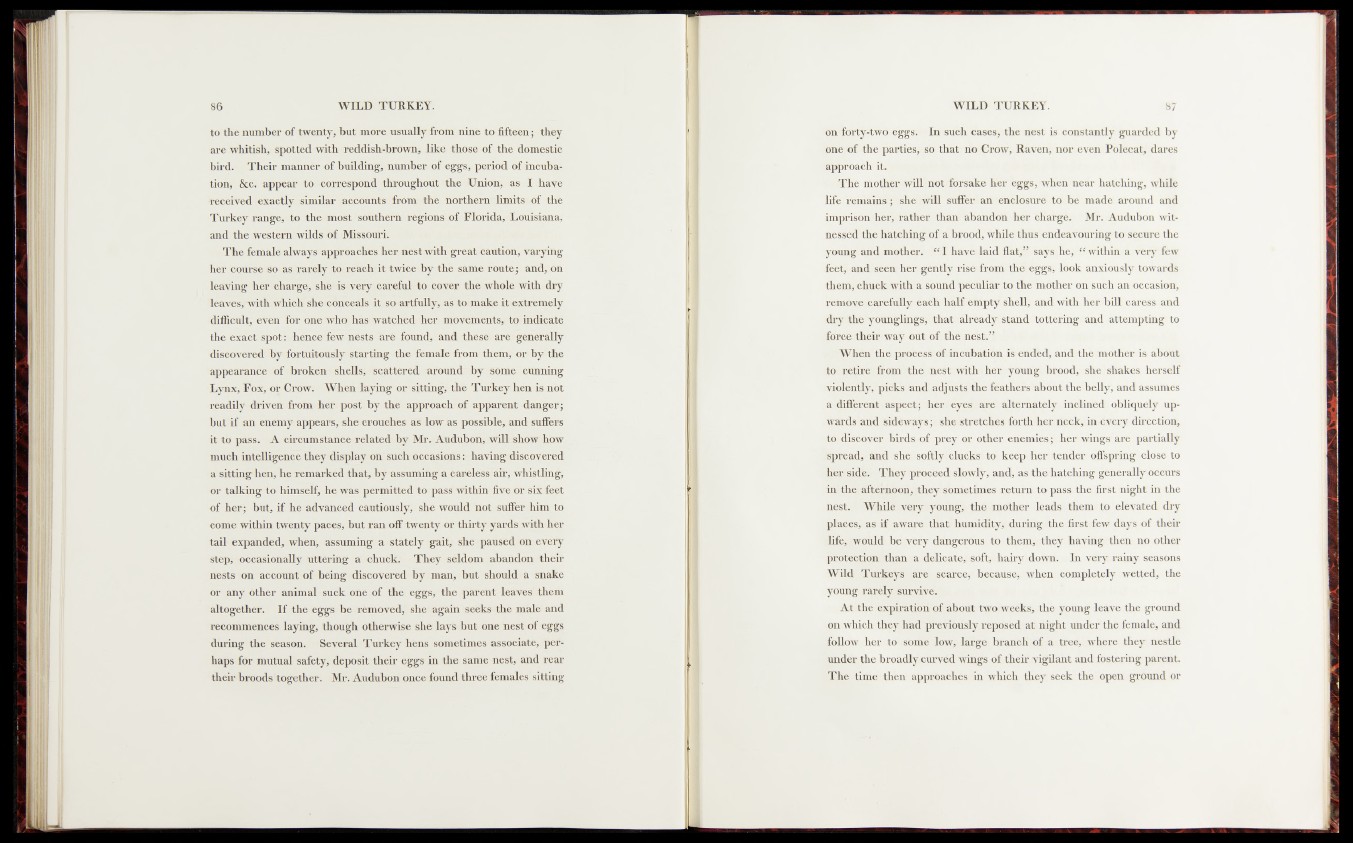
to the number of twenty, butmörein^ualkyfrom nine <to fifteen; they
are whitish, spotted with reddish-brown, like those of .the domestic
bird. Their manner of building, number of eggs, period dföincujba-
tion, &c.' appear to correspond throughout the Union, as I have
«received »e&.a^Ü!yr (similar -accounts from the northern eliuiits*of the
»Tfirbey range, rto the^most ’sotithem regions of- Florida, Louisiana,
and the westerns wilds1 tef Missourii
' The female alwaysiappisoachtes her,.nest with great caution, varying
her 'cdgflicfSoias rarely to reach it twice-by the same route; and, on
leaving her chargejfslpSs»very carefid- tQstH^M'.^È^^hólejïwith dry
leaves,-withwhiclf she^ofeeeafe' it-, soaartfullp: as toim#ie itsextremely
SdifficÖlt^e^ên ïor one who hasttwatohedbiherj movements,* *to indicate
the ex act^l^Dtmme^ few nests are found, andf jthesef are; generally
»dis&bweredthy fortuitously starting t-the^^Mi^pFonï^lett^or^byrthe
appearance of ^brokenv'<«hells, scattered around" by'isonie cunning
Lynx, Fbx, or Crow. When laying or sitting, thé Turkey hen ismot
readily*drais*en?drom her post by the approach of apparent danger;
but if an eneiny appears, she crouches as low as possiblë, and suffers
it to pass.-jA circumstance related by Mr. Audubon, -mUt&hQWihbiW
much intelligence they display oh* such occasions: having tdascovér.ed
a sittin'gdftkïf the ‘remarked that, by assuming a careless air&wlii&tling)
t# talking tO’hims'eh^he was permitted to pass witiHn-w & Sj sixlf^üt
of her; but, if he advanced cautiously^: she would suffer him to
eome within twenty paces, but ran off twenty or thirty yards with Her
tail expanded, when, assuming a stately gait, she paused on~cve%
step, occasionally uttéring a chuck; -They sèldorn abandon their
nests on account of being discovered by man, but should a snake
on any other animal suck one of the eggs, the parent leaves' them
altogether. If the eggs be removed, she again seeks the male and
recommences laying, though otherwise shè lays but one nest of eggs
during the season. Several Turkey hens sometimes associate, perhaps
for mutual safety, deposit their eggs in the same nest, and rear
their broods together. Mr. Audubon once found three females sitting
on' forty-tsSv$teggs!.< * In such cases, the nest is constantly guarded by
nnemf the.parties;*so that no Crow, Raven, nor even Polecat, dares
-approach it.
- ‘The mother will not forsake her eggs, when near hatching, while
life rent-aii;iS; *.she will suffer an enclosure to* bé made around and
imprisonj her, rather than abandon her chargéj Mr. Audubon witnessed
the hatching of a brood, while thus endeavouring to secure the
young and mother Iqjgjd havé. laid flafc,#&ays he, “ within a very few
feet,-, and S'Sfebn; her gently rise from ^d^eggs; look anxiously towards
them, chuck with a sound.peculiarito the mother on such an occasion,
remove carefully each halhénfpty ®|lly and tfjytib Tier bill caress and
dry the-vyóifogüngs>J*ha$ already stand 'tottering and attempting to
force ithbir way out
When th&profeess of incubation is ended, and the mother is about
-töï. retire from the nest with *berryoimgi broody snejtshakes herself
violently, picks and* adjnit^lfeéffeaitheés»about the belly, and assumes
a different aspect; Abr $ eyes are alternately inclined obliquely upwards
and si deways; she Stretches forth her neck, hr every direction,
to discovéè hïk.d’S* of; prby or other enemies^,» her wings are partially
spread, and she* »softly clucks to keep her tender offspring dose to
her side, ;f]|heyi proceed slowly, and, as the hatching generally occurs
in p|p afternoon, they sometimes return tbpass the first night in the
nest. While very young, tjhp mother leads them to elevated dry
places, as if aware that humidity;-, during the first few days of their
life, would be very dangerous to them, they having then no other
protection than a delicateysofb, hairy down. In very rainy seasons
Wild Turkeys are sparee;' because, when completely wetted, the
young rarely survive.
At the expiration of about two weeks, thb young leave the ground
on which they had previously reposed at night under the female, and
follow her tó soJÉe low, large braneh of a tree, where they nestle
under the broadly curved wings of their vigilant and fostering parent.
The time then approaches in which they seek the open ground or